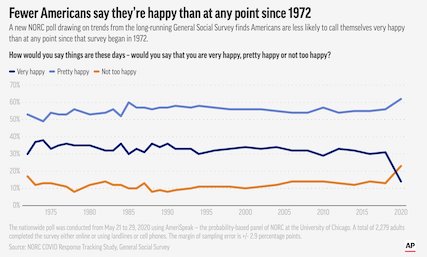What We’re Reading
There are two ways here: you get paid more or everything you buy is cheaper. And people always really underestimate, I think, the benefits of everything getting cheaper. And so the stuff that we actually build is getting cheaper all the time. And that’s fantastic. The stuff we don’t build, and very specifically, we don’t have housing, we’re not building schools, and we’re not building anything close to the health care system that we should have - for those things the prices just are skyrocketing. That’s where you get this zero sum politics.I think people have a very keen level of awareness. They can’t put it into formal economic terms but they have a keen awareness of the markers of a modern western lifestyle. It’s things like - I want to be able to own a house, I want to live in a nice neighborhood and I want to be able to send my kids to a really good school and I want to have really good health care.
Nothing’s ever as good or as bad as it seems. When you’re doing really well and you killed it, realize that you’re lucky and be grateful and be gracious. And then when you screw up and you’re staring at the ceiling at night and worried and anxious and angry and depressed, recognize that at the end of your life, the reason you’re going to be upset about that moment won’t be what happened—but how you responded. And you’ll wish you hadn’t been so hard on yourself.
A survey conducted in Italy on the psychological impact of coronavirus lockdowns on children has quantified what many parents observed during weeks cooped up at home: kids were more irritable, had trouble sleeping and for some of the youngest, wept inconsolably and regressed developmentally.
Those symptoms were more pronounced in families in which the parents were particularly stressed and in families with elderly relatives at high risk of becoming seriously ill with COVID-19, the national survey by the Giannina Gaslini Pediatric Hospital in Genoa in conjunction with the University of Genoa found.
WFH:
Business communications platform Slack will introduce a permanent flexible working policy for the majority of its 1,664 employees.
The organisation has made the decision to not reopen its offices due to the Covid-19 (Coronavirus) pandemic, until at least 1 September 2020, and when the offices do open, if their roles permits, employees will have the option to work flexibly, permanently.
Additionally, Slack are also looking at recruiting employees who solely work remotely.
Colleges are holding out hope of in-person classes in order to keep up enrollments.” She added: “If they tell the difficult truth now, many students will decide to take a year off,” which “will send college finances into a tailspin.”

Have a good weekend, stay safe.